| Srl | Item |
| 1 |
ID:
075500
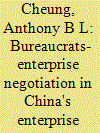

|
|
|
|
|
| Publication |
2005.
|
| Summary/Abstract |
This article explores the implementation of SOE reform in China at the local level, using case studies in Guangzhou as illustration. It is argued that local government spearheads a reform agenda that puts locally-defined state objectives first, not necessarily favouring enterprise restructuring. A full-fledged negotiation model does not exist in SOE reforms because all enterprises are controlled by the state and have to comply with top-down policies and orders. Government-enterprise relations and the degree of entrepreneurial power depend largely on the economic strength of the enterprise, with the boomers getting a good economic bargain while the laggards fail to gain sympathy from government. Enterprise workers are largely at the mercy of restructuring decisions that come from bargaining and at times collusion between managers and local bureaucrats.
|
|
|
|
|
|
|
|
|
|
|
|
|
|
|
|
| 2 |
ID:
075494
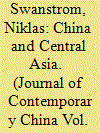

|
|
|
|
|
| Publication |
2005.
|
| Summary/Abstract |
Central Asia and China have been closely intertwined in history and today that relationship has begun to re-emerge. This article analyses the reasons for the close cooperation which has re-emerged in the 1990s and boomed in the twenty-first century. Domestic and internal factors, as well as political and economic considerations are included in the search for an explanation for current relations and future expectations. Despite the fact that China has emerged as one of the world's most powerful states, its dependence on the Central Asian states in regard to oil and gas but also domestic security is intriguing. The future of Sino-Central Asian relations is deeply embedded in joint problems and common interests, but also in fear of domination and external intervention.
|
|
|
|
|
|
|
|
|
|
|
|
|
|
|
|
| 3 |
ID:
075495
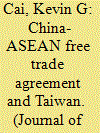

|
|
|
|
|
| Publication |
2005.
|
| Summary/Abstract |
While China's move toward a FTA with ASEAN reflects Beijing's most recent foreign economic policy adjustment and represents a new stage in the nation's open-door policy, it inevitably produces significant impact on cross-Taiwan Straits relations. This recent development in China's foreign economic relations brings not only substantial psychological and real effects and pressure on Taiwan for its possible isolation and marginalization from the ongoing process of regional integration in East Asia, but also growing pressure exerted by the island's business community that fears being pushed into a disadvantageous position in competition with ASEAN companies in the ever expanding and lucrative market of the mainland. For strategic, diplomatic, and economic considerations in the face of this new challenge, Taiwan is pursuing counter-measures by searching for its own FTAs with other countries within and beyond the region.
|
|
|
|
|
|
|
|
|
|
|
|
|
|
|
|
| 4 |
ID:
075496
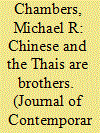

|
|
|
|
|
| Publication |
2005.
|
| Summary/Abstract |
During the late 1970s and 1980s, the Chinese and Thais forged a close, friendly relationship based on their security cooperation in an informal alliance against Vietnamese regional hegemonism. In the 1990s, after the end of the Cambodian conflict and the Vietnamese threat, the Sino-Thai cooperative friendship became deeper and broader, rather than dissipating. How are we to explain the closeness of Sino-Thai relations today? While the dynamics of the international political structure in East Asia have played a critical role in shaping the relationship between these two countries since the founding of the People's Republic of China, the emerging regional international structure-particularly the rise of China-provides indeterminate incentives. Thailand could balance against or bandwagon with rising China, or try to hedge its bets; nor does the emerging structure direct how the Chinese will wield their growing influence and power over their neighbors. This article argues that the best explanation rests in a combination of the structural argument (the rise of China) with the desire of both countries to maintain the mutually beneficial partnership they constructed during the 1980s, in particular Thailand's role as a link or facilitator between the PRC and ASEAN.
|
|
|
|
|
|
|
|
|
|
|
|
|
|
|
|
| 5 |
ID:
075497


|
|
|
|
|
| Publication |
2005.
|
| Summary/Abstract |
Conventional wisdom has held that China is a success and India is a failure, that India's democracy leads to its poverty and religious intolerance, and China's economic reform without political opening was the only correct path to development and stability. The success of the Indian domestic software industry awed many Chinese and contributed to recent online discussion of India among Chinese scholars. This article sheds light on the changing views of India in China through surveying online articles posted on two major Chinese websites. The new discourse focuses on the historical, cultural, and institutional roots, particularly government policies that have led to the current situation in India. The new Chinese discourse also reflects evaluations of China's own economic policies in the past few decades.
|
|
|
|
|
|
|
|
|
|
|
|
|
|
|
|
| 6 |
ID:
075498


|
|
|
|
|
| Publication |
2005.
|
| Summary/Abstract |
This study deals with the political economy of local financial industries in China. It focuses on the changing patterns of political interference and the key role of Communist Party bodies in shaping business incentives. The centralization measures in the financial sector that were implemented under the Zhu Rongji government in 1998 and 1999 turned out to be not very effective in supervising local financial institutions. From 2000 to 2003, a trend towards a reaffirmation of local control in financial business emerged. Local governments began to set up new financial work bodies with comprehensive functions and extensively used local banks as their 'moneybag' again. Reducing the risks involved in the current politicized management of local financial business will be inseparable from political, legal and regulatory changes: curbing the Communist Party's role in cadre appointments, strengthening legal corporate governance structures and clarifying the division of labor among national and local supervisory bodies.
|
|
|
|
|
|
|
|
|
|
|
|
|
|
|
|
| 7 |
ID:
075501
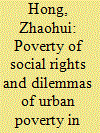

|
|
|
|
|
| Publication |
2005.
|
| Summary/Abstract |
This article, drawing references from popular theories of social exclusion, capability and civil rights, develops a concept-the poverty of social rights-in the causal analysis of poverty. The author believes that deficiency of economic resources and working capability are not the only reasons for urban poverty; in fact, the lack of social rights on the part of the disadvantaged sectors of society constitutes simultaneously the cause and consequence of urban poverty. The article defines the concept of poverty of social rights and its characteristics, and analyzes its China phenomenon. In the end the article poses several options and remedies for China's poverty-relief efforts through designing and implementing a Chinese-style affirmative action.
|
|
|
|
|
|
|
|
|
|
|
|
|
|
|
|
| 8 |
ID:
075499
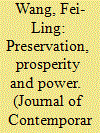

|
|
|
|
|
| Publication |
2005.
|
| Summary/Abstract |
This article describes the motives behind the making of the current status-quo and risk-averse Chinese foreign policy. It identifies a three-P incentive structure that is based on the political preservation of the CCP regime, China's economic prosperity, and Beijing's pursuit of power and prestige. These three motives are stable and overlapping, featuring Taiwan and the relationship with the United States as the key issues. Beijing is expected to be motivated by these peculiar motives over the next two decades; but new internal and external developments may greatly change these motives and generate new impetus for China's foreign policy. Although the official line in Beijing is still the mild 'peaceful development', after a fling with the more majestic idea of 'peaceful rise', the rise of nationalist emotions and demands in the PRC continues.
|
|
|
|
|
|
|
|
|
|
|
|
|
|
|
|